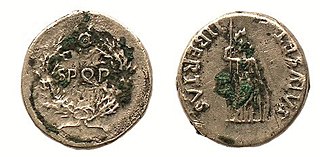 W
WLucius Sergius Catilina, known in English as Catiline, was a Roman patrician, soldier and senator of the 1st century BC best known for the second Catilinarian conspiracy, an attempt to overthrow the Roman Republic and, in particular, the power of the aristocratic Senate. He is also known for several acquittals in court, including one for the charge of adultery with a Vestal Virgin.
 W
WGaius Julius Vindex was a Roman governor in the province of Gallia Lugdunensis. He was of a noble Gallic family of Aquitania, and was one of the men belonging to a faction of Empress Agrippina, the mother of Nero. Vindex had taken part in a conspiracy against the emperor in 59. However, with the assassination of Agrippina by Nero, this faction was dissolved.
 W
WLucius Junius Brutus is the semi-legendary founder of the Roman Republic, and traditionally one of its first consuls in 509 BC. He was reputedly responsible for the expulsion of his uncle the Roman king Tarquinius Superbus after the suicide of Lucretia, which led to the overthrow of the Roman monarchy. He was involved in the abdication of fellow consul Tarquinius Collatinus, and executed two of his sons for plotting the restoration of the Tarquins.
 W
WPublius Licinius Crassus was one of two sons of Marcus Licinius Crassus, the so-called "triumvir", and Tertulla, daughter of Marcus Terentius Varro Lucullus. He belonged to the last generation of Roman nobiles who came of age and began a political career before the collapse of the Republic. His peers included Marcus Antonius, Marcus Junius Brutus, Decimus Junius Brutus Albinus, the poet Gaius Valerius Catullus, and the historian Gaius Sallustius Crispus.
 W
WMarcus Caelius was the senior centurion in XVIII Roman Legion who was killed in the Battle of the Teutoburg Forest. He is known from his cenotaph, which was discovered in 1620 in Birten, Germany. Caelius is depicted wearing his military uniform, with phalerae, armillae, and a corona civica, while in his right hand, he holds a vitis. On either side of his image are his freedmen, Privatus and Thiaminus.
 W
WJulius Nepotianus, sometimes known in English as Nepotian, was a member of the Constantinian dynasty who reigned as a short-lived usurper of the Roman Empire. He ruled the city of Rome for twenty-eight days, before being killed by his rival usurper Magnentius' general Marcellinus.
 W
WLucius Roscius Fabatus was a military officer and politician of the late Roman Republic.